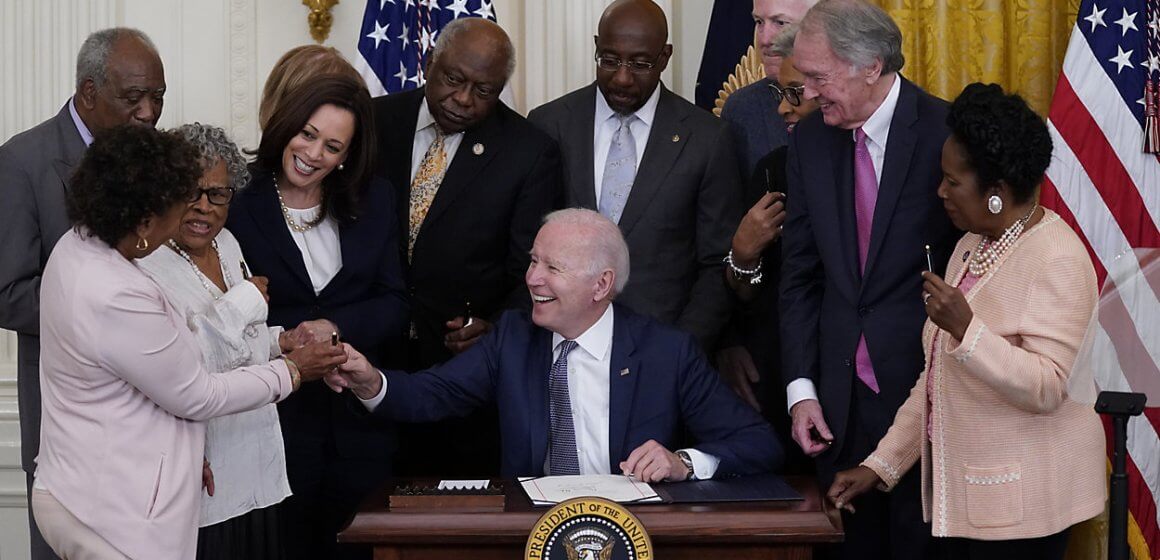|
LISTEN TO THIS THE AFRICANA VOICE ARTICLE NOW
Getting your Trinity Audio player ready...
|
Juneteenth, also known as Freedom Day or Emancipation Day, is an immensely significant federal holiday celebrated in the United States on June 19 each year. It commemorates the emancipation of enslaved African Americans, who endured two extra years of slavery in Texas and serves as a reminder of the ongoing struggle for equality and justice. The origins of Juneteenth can be traced back to the final stages of the American Civil War and the proclamation of freedom for enslaved Africans but misinformation and myths regarding the holiday persist.
Recognition as a Federal Holiday
Juneteenth’s legacy was significantly boosted when it was officially recognized as a federal holiday. On June 17, 2021, President Joe Biden signed the Juneteenth National Independence Day Act into law, making it the first new federal holiday since Martin Luther King Jr. Day was established in 1983.
“This is a day of profound weight and profound power, a day in which we remember the moral stain, the terrible toll that slavery took on the country and continues to take,” Biden said in 2021.
This historic recognition marked a major milestone in acknowledging the significance of Juneteenth in American history and culture.
Biden’s 2023 Juneteenth Message
Biden released a statement on June 16, marking Juneteenth second year recognition as a federal holiday stating the following:
On Juneteenth, we commemorate that day and honor the tireless work of abolitionists who made it their mission to deliver the promise of America for all Americans. We honor the generations of activists who have advanced the need for our Nation to recognize Juneteenth as a way to reconcile our past as we build a new American future together — advocates like former State Representative Al Edwards, who authored the bill that made Texas the first state to designate Juneteenth a holiday, and Ms. Opal Lee, known as the grandmother of Juneteenth, who joined me at the bill signing that finally made it a Federal holiday. President Joe Biden
The Era of Slavery
To understand the significance of Juneteenth, we must reflect on the era of slavery in the United States. Slavery was deeply entrenched in the nation’s history, with millions of African men, women, and children enduring unimaginable torture and cruelty as they toiled under oppressive conditions. Slavery continued even after President Abraham Lincoln issued the Emancipation Proclamation on January 1, 1863, which declared that all enslaved individuals in Confederate states were to be set free.
Juneteenth Emerges Despite Enslavers’ Delay of Freedom
On June 19, 1865, Union General Gordon Granger arrived in Galveston, Texas, with news that the Civil War had ended and enslaved people were now free. The delay in spreading this crucial information to Texas can be attributed to a lack of Union troops in the region and slaveholders’ resistance to relinquishing their control over enslaved individuals.
The falsely report suggests enslaved people were unaware of they were emancipated, but accounts states news about the emancipation proclamation were widely reported in Texas newspapers when it happened and the news spread like bush fire. It’s absurd, therefore to suggest that enslaved people were unaware they were free. The most plausible explanation is Texas enslavers intentionally denied them freedom for two years, milking them of free labor.
Disputed reports indicate that upon General Granger’s arrival, he read General Order No. 3, which stated, “The people of Texas are informed that, in accordance with a proclamation from the Executive of the United States, all slaves are free.”
Accounts of the events reported in NPR indicate Granger may have not read General Order No. 3 as widely reported, rather he gave the report to enslavers who read it to enslaved people.
Involvement of US Presidents:
Several US presidents played a role in shaping the era leading up to Juneteenth and its aftermath. President Abraham Lincoln’s Emancipation Proclamation laid the groundwork for the eventual freedom of enslaved individuals, though its immediate impact was limited due to the ongoing Civil War. Lincoln’s unwavering commitment to the abolition of slavery set the stage for the subsequent events that would unfold.
President Andrew Johnson Undermined Civil Rights
President Andrew Johnson, who succeeded Lincoln after his assassination, faced the daunting task of overseeing the Reconstruction period and he failed. His lenient policies toward the South and approach hindered the progress of civil rights for African Americans and impeded the full realization of freedom promised by the Emancipation Proclamation.
President Johnson allowed former Confederate states to enact restrictive “Black Codes” that imposed harsh regulations on newly freed African Americans. These codes aimed to maintain white supremacy and control over the formerly enslaved population. They limited the rights and freedoms of African Americans, often forcing them into exploitative labor arrangements that resembled slavery.
President Ulysses S. Grant, who served two terms following Johnson, vigorously championed the cause of civil rights. Grant’s presidency witnessed significant advancements, including ratifying the Fifteenth Amendment in 1870, which granted African American men the right to vote. These milestones reinforced the principles of freedom and equality that Juneteenth came to symbolize.
Biden Leads Efforts for Juneteenth Recognition as a Federal Holiday
Juneteenth’s legacy was significantly boosted when it was officially recognized as a federal holiday. On June 17, 2021, President Joe Biden signed the Juneteenth National Independence Day Act into law, making it the first new federal holiday since Martin Luther King Jr. Day was established in 1983.
“This is a day of profound weight and profound power, a day in which we remember the moral stain, the terrible toll that slavery took on the country and continues to take,” Biden said.
This historic recognition marked a major milestone in acknowledging the significance of Juneteenth in American history and culture.
It is worth noting that President Barack Obama played a vital role in the journey toward federal recognition of Juneteenth. During his presidency, Obama spoke about the importance of Juneteenth and its relevance in honoring the struggle and contributions of African Americans. His support and advocacy helped elevate the national conversation surrounding Juneteenth, paving the way for its eventual designation as a federal holiday.
The Legacy of Juneteenth:
In the years following the first Juneteenth celebrations, the holiday spread throughout Texas and eventually gained recognition in other parts of the United States. African American communities embraced Juneteenth as a day of remembrance, celebration, and reflection, passing down its significance from generation to generation.
The holiday is a powerful symbol of resilience and the ongoing struggle for equality. As a federal holiday, Juneteenth holds even greater significance now, providing an opportunity for all Americans to reflect on the history of slavery and the ongoing fight against systemic racism. It serves as a reminder of the work that still needs to be done to achieve true equality and justice.
Juneteenth stands as a testament to the resilience of the African American community and their enduring fight for freedom and equality. Born out of the tumultuous era of the Civil War and the efforts of crucial US presidents, Juneteenth serves as a powerful reminder of the injustices of the past and the ongoing quest for social justice. The recognition of Juneteenth as a federal holiday further solidifies its importance in American history and the collective commitment to a more inclusive and equitable future.






























LEAVE A COMMENT
You must be logged in to post a comment.